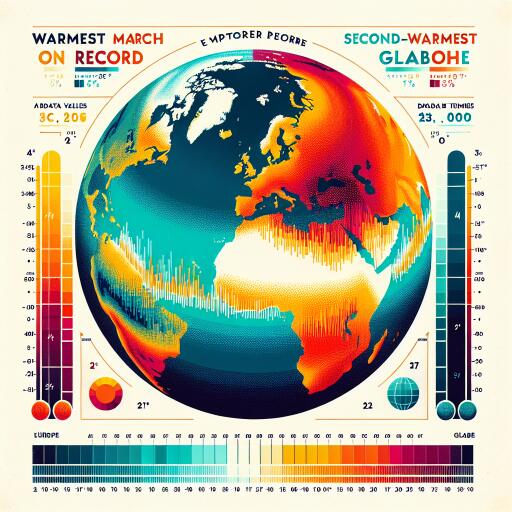
Europe Sees Warmest March on Record, Second-Warmest Globally
Europe has experienced its warmest March since records began, with average temperatures soaring to just over 6 degrees Celsius, which is 2.41 degrees higher than the average from 1991 to 2020. This striking increase in temperature raises significant concerns about reaching the international goal of limiting global warming to 1.5 degrees Celsius above pre-industrial levels.
Globally, March marked the second-highest average temperature ever documented for the month. This sustained rise in temperatures highlights the urgent need for action as the global community grapples with challenging climate targets. While projections suggest that 2024 might breach the 1.5-degree threshold, it is only considered a definitive miss if this level is sustained over several years.
Adding to this worrisome scenario, the Arctic recorded its lowest sea ice extent for any March in history, underscoring the profound changes occurring in polar regions as they continue to warm at an alarming rate. The diminished sea ice extent in the Arctic points to long-term impacts on global climate patterns and ecosystems.
Central Europe has been notably affected by these climatic anomalies. Countries like Germany endured unusually dry conditions, signaling a visible stress on ecosystems. The lack of moisture has adversely impacted plant and animal life, manifesting in various ecological disruptions.
The European Centre for Medium-Range Weather Forecasts characterized March as a period of “contrasting rainfall extremes.” While numerous regions reported their driest March on record, others experienced their wettest March in at least 47 years, highlighting the unpredictability of weather patterns across the continent.
Steffi Lemke, Germany’s Environment Minister, expressed serious concern over the current drought conditions. She warned of an unprecedented spring dryness affecting large parts of the country. This climatic phenomenon is already having substantial effects on agriculture and forestry, raising concern over increased wildfire risks and potential reductions in crop yields.
The stark warning from nature calls for immediate, concerted efforts to address the climate crisis. The situation emphasizes the need for robust adaptation and mitigation strategies to handle these environmental challenges effectively. As the impacts of climate change become more evident, the call for urgent global action grows ever stronger.





Leave a Reply